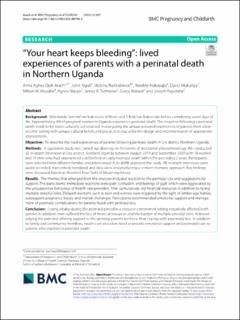| dc.contributor.author | Arach, Anna Agnes Ojok | |
| dc.contributor.author | Kiguli, Juliet | |
| dc.contributor.author | Nankabirwa, Victoria | |
| dc.contributor.author | Nakasujja, Noeline | |
| dc.contributor.author | Mukunya, David | |
| dc.contributor.author | Musaba, Milton W. | |
| dc.contributor.author | Napyo, Agnes Kasede | |
| dc.contributor.author | Tumwine, James K | |
| dc.contributor.author | Ndeezi, Grace | |
| dc.contributor.author | Rujumba, Joseph | |
| dc.date.accessioned | 2022-12-09T15:05:29Z | |
| dc.date.available | 2022-12-09T15:05:29Z | |
| dc.date.created | 2022-09-16T09:43:05Z | |
| dc.date.issued | 2022-06-15 | |
| dc.identifier.issn | 1471-2393 | |
| dc.identifier.uri | https://hdl.handle.net/11250/3037070 | |
| dc.description.abstract | Background: Worldwide, two million babies are stillborn and 1.8 million babies die before completing seven days of life. Approximately 4% of pregnant women in Uganda experience perinatal death. The response following a perinatal death tends to be socio-culturally constructed. Investigating the unique personal experiences of parents from a low-income setting with unique cultural beliefs and practices is crucial for the design and implementation of appropriate interventions.
Objective: To describe the lived experiences of parents following perinatal death in Lira district, Northern Uganda.
Methods: A qualitative study was carried out drawing on the tenets of descriptive phenomenology. We conducted 32 in-depth interviews in Lira district, Northern Uganda between August 2019 and September 2020 with 18 women and 14 men who had experienced a stillbirth or an early neonatal death within the preceding 2 years. Participants were selected from different families and interviewed. A local IRB approved the study. All in-depth interviews were audio-recorded, transcribed, translated, and data were analysed using a content thematic approach. Key findings were discussed based on Worden’s Four Tasks of Mourning theory.
Results: The themes that emerged from the analyses included reaction to the perinatal loss and suggestions for support. The participants’ immediate reactions were pain, confusion, and feelings of guilt which were aggravated by the unsupportive behaviour of health care providers. Men cumulatively lost financial resources in addition to facing multiple stressful roles. Delayed reactions such as pain and worries were triggered by the sight of similar-age-babies, subsequent pregnancy losses, and marital challenges. Participants recommended emotional support and management of postnatal complications for parents faced with perinatal loss.
Conclusion: Losing a baby during the perinatal period in a resource-constrained setting negatively affected both gender. In addition, men suffered the loss of financial resources and the burden of multiple stressful roles. Acknowledging the pain and offering support to the grieving parents reinforce their coping with a perinatal loss. In addition to family and community members, health care providers need to provide emotional support and postnatal care to parents who experience perinatal death. | en_US |
| dc.language.iso | eng | en_US |
| dc.publisher | BMC | en_US |
| dc.rights | Navngivelse 4.0 Internasjonal | * |
| dc.rights.uri | http://creativecommons.org/licenses/by/4.0/deed.no | * |
| dc.title | “Your heart keeps bleeding”: lived experiences of parents with a perinatal death in Northern Uganda | en_US |
| dc.type | Journal article | en_US |
| dc.type | Peer reviewed | en_US |
| dc.description.version | publishedVersion | en_US |
| dc.rights.holder | Copyright 2022 the authors | en_US |
| dc.source.articlenumber | 491 | en_US |
| cristin.ispublished | true | |
| cristin.fulltext | original | |
| cristin.qualitycode | 1 | |
| dc.identifier.doi | 10.1186/s12884-022-04788-8 | |
| dc.identifier.cristin | 2052326 | |
| dc.source.journal | BMC Pregnancy and Childbirth | en_US |
| dc.relation.project | Norges forskningsråd: 223269 | en_US |
| dc.identifier.citation | BMC Pregnancy and Childbirth. 2022, 22, 491. | en_US |
| dc.source.volume | 22 | en_US |

